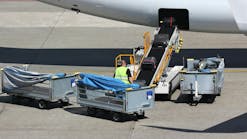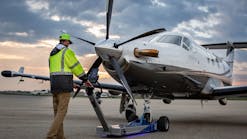Part of the airport's success comes from its continual investment in pioneering technology across the terminal. Working with Cisco Systems, the worldwide leader in networking for the Internet, AIA has deployed Cisco's Intelligent Airport Solution, providing the airport with a simple infrastructure for voice, data and video -and giving it the option to deploy a host of new cost saving applications to both passengers and staff. Based on the open standards of Internet Protocol (IP), the framework is the perfect foundation for the airports network as it allows AIA to offer a complete range of services, such as wireless hotspots and IP telephony phones via a well-defined infrastructure.
AIA, which is run by a public-private partnership, is the largest airport in Greece and serves more than 13 million travellers annually. In the summer it serviced a record number of passengers -69,000 - on the closing day of the 2004 Olympic games. Working with Cisco to converge the separate networks into a single, more secure and flexible framework has helped AIA to service the high levels of airport traffic and meet increased customer demands by offering a wide range of operational benefits such as:
- Enhanced safety and security for travellers, baggage and airport workers and visitors
- Optimised capacity and productivity thus streamlining passenger flow
- New applications and services at a lower cost; with decreased network maintenance and training costs
- Network security, resiliency and responsiveness: protecting against internal and external network and data infrastructure threats and outages
''The Information Technology and Telecommunication (IT&T) Department of AIA wanted to provide state of-the-art services to all members of the airport community, airlines, governmental agencies, concessionaires, handlers, passengers and visitors,'' said Fotis Karonis, CIO AIA. ''Working with Cisco has helped us to improve both operations and processes through seamless corporate network that delivers cost effective quality services. AIA can now ensure business continuity and provide non-stop services to nearly 300 companies within the airport community.''
The implementation of the new network has taken place in two phases. To date, AIA has implemented more than 100 wireless local area network (WLAN) access points across the terminal and has finished the pilot implementation and evaluation of the IP telephony solution in designated areas. Working with a local XML (Extensible Markup Language) CPI developer, Webopsis (www.webopsis.gr), the IP phones run a number of applications including web browsing, photo security checks, traffic statistics presentation and information feeds from the flight information display system (FIDS). AIA ultimately plans to expand the IP telephony service across the whole airport.
Begun in 2002, stage one of the project was to install WLAN access points. This allows customers to access the Internet via their laptops or PDAs anywhere within the main terminal building, making AIA one of the first International airports to do so. It also provided AIA staff with the flexibility of the Internet and intranet via mobile devices. AIA staff use their PDA's to access a number of applications remotely including searching for updates on flight information or airlines. The PDAs also act as security checking devices, allowing staff to double-check employee identities quickly and easily from any point in the airport. The next stage of the WLAN project, which is due to start this year, will offer full wireless coverage across all airport grounds including the runway and eventually on aircrafts.
The second phase of the project, to install IP communications, started at the beginning of 2004. Its aim was to offer communications for airport workers on the move while also reducing operational costs. The installation of IP phones at designated areas in the airport including checkpoint gates (in the perimeter of the airport area) is the first important step of the project. Previously it was not possible to have PCs stationed at checkpoint gates because of their size and expense to run. The installation of IP phones has enabled staff to deal with visitors and employee traffic quickly by providing staff with the equipment to access to up-to-date information at the gates.
''As a result of our collaboration with AIA the airport of the future is here today,'' said Nikos Lambrogeorgos, Cisco Systems. ''The open-standard interoperable nature of Cisco technologies means AIA can support a range of services on a single platform, which is a critical part of its business strategy.''
The smooth running of the airport was never so important as during this years Olympic games when flawless operations and efficient handling resulted in four new records being set for the airport. The technology infrastructure helped AIA to achieve new historical records in volumes of aircraft movements, passenger traffic, baggage handling, and flight punctuality.
Cisco Systems works with many other airports around the world including Toronto, Munich and Charles De Gaulle and deployment of the Cisco Intelligent Airport solution in these airports has resulted in a wide range of operational benefits. More information on Cisco Intelligent Airport Solutions and customers can be found on the Cisco Systems web site.About Cisco Systems
Cisco Systems, Inc. (NASDAQ:CSCO), the worldwide leader in networking for the Internet, this year celebrates 20 years of commitment to technology innovation, industry leadership and corporate social responsibility. Information on Cisco can be found at www.cisco.com. For ongoing news, please go here.About Athens Airport
Athens Airport - IT Department Information



